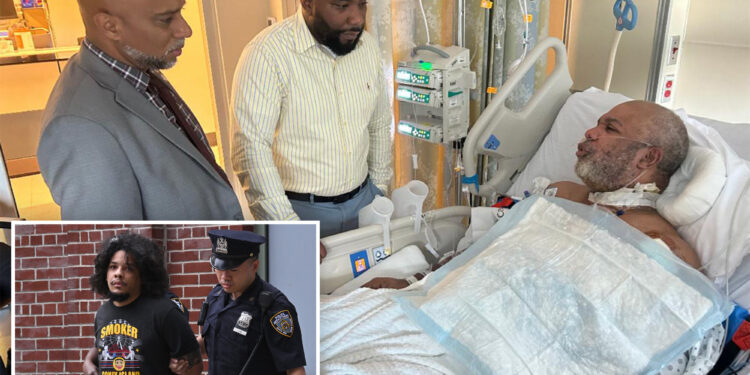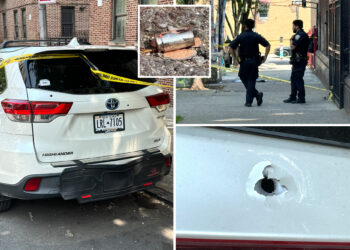
The city’s largest transit workers’ union is demanding that the MTA ramp up safety measures at the end of subway lines in the wake of the brutal stabbing of train operator Myran Pollack in Brooklyn last week.
Members of the Transport Workers Union Local 100 — which represents more than 40,000 bus and subway workers — rallied Thursday outside the Crown Heights-Utica Avenue station at the end of the No. 4 line, the same stop where a recidivist attacker stabbed 60-year-old Pollack twice on Oct. 8.
“We need real action now. Our members are facing unacceptable dangers, and the current policies just aren’t cutting it,” Richard Davis, President of TWU Local 100, said in a statement.
“It’s time for the MTA to step up and take responsibility for protecting the workers who keep this city running.”
The union is pushing for a change to regulations so that transit employees no longer work alone while taking trains out of service.
They are urging that conductors and train operators walk the cleared-out train together to ensure that no passengers are still on board.
Over the past three years, 31 MTA workers have been assaulted while cleaning out trains, “further proving the urgent need for safety reforms,” the union said.
In Pollack’s case, he was attempting to clean out the train alone when he asked lingering passenger Jonathan Davalos, 27, to leave, authorities said.
Instead of complying, Davalos allegedly flew into a rage, following Pollack onto the platform before attacking him so viciously that he required at least two surgeries.
The union is also calling for MTA police to be present at all stations where trains are evacuated – so that they are on hand to help if passengers turn violent.
“These aren’t just suggestions—they’re life-saving measures,” Canella Gomez, TWU Local 100 Rapid Transit Operations Vice President said in a statement. “Our members should never have to face these dangers alone. We need stronger policies and faster responses to keep our people safe.”
Union members are additionally pushing for frequent meetings between top MTA officials and TWU Local 100 “to review and implement enhanced safety protocols for frontline workers.”
“Transit workers must be respected and protected!” union members chanted at the Thursday gathering. “Enough is enough!”
Some held signs that read, “We don’t come to work to be punching bags” and “Were you safe today or just lucky?”
The latest NYPD data – which covers the period from Jan. 1 through Oct. 6 – indicates that attacks on MTA subway employees across the city have dipped to 30 from the 44 reported during the same time frame in 2023.
In one such incident last month, Robert Ray, 33, randomly punched a female station agent in the face in Midtown, claiming he did it because “because the voices in my head were talking to me,” prosecutors said.
In late May, an on-duty MTA conductor was socked in the face as he tried to break up a fight at a Queens subway station, authorities said.
Earlier that month, a train operator was clearing a Queens train of passengers so it could be taken to a lay-up location when a crazed commuter tackled him, knocking him to the floor of the car, police said.
Another conductor was randomly whacked in the head with a glass bottle by an unhinged stranger in the Bronx back in March, cops said.
Interim NYC Transit President Demetrius Crichlow did not directly address the union’s demands but said the MTA is working to keep repeat offenders off the streets.
“Before his heinous assault on a train operator, Jonathan Davalos had on different days attacked another subway employee and a rider,” Crichlow said in a Friday statement.
“This recidivist behavior is why the MTA has fought in Albany for harsher penalties for crimes occurring in the transit system, and why we push for the most aggressive possible prosecutions when employees, customers and police are assaulted,” the statement said.
“We are happy to have TWU Local 100 join that effort, and to have their support for the NYPD and the district attorneys, as they work to ensure that maximum possible consequences are imposed.”
An agency spokesman said that the MTA will continue to discuss safety matters with its “labor partners.”



























